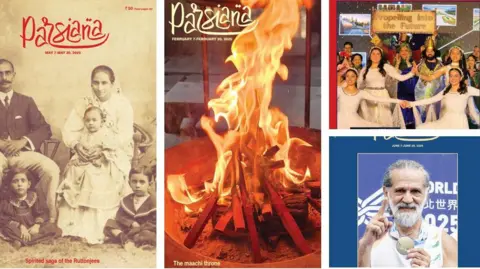In the suburbs of Damascus, the heavy sound of gunfire prompted Lama al-Hassanieh to lock herself in her bathroom, clutching her phone as chaos erupted outside her home. This violence, stemming from sectarian tensions, erupted in April following a false audio recording that incited hostility towards the Druze, a historically marginalized group in Syria. As armed groups roamed the streets, chanting threats against the Druze, Lama felt the weight of distrust surround her.
The Druze, whose faith is an offshoot of Shia Islam, have experienced fragile political positioning throughout Syria's civil war. Under former President Bashar al-Assad, they often maintained a quiet allegiance to the regime, believing it would provide them some protection from violence. Yet recent attacks by Islamist militias have disturbed this fragile alliance, escalating fears of persecution.
The surge in violence culminated in the deaths of over 137 individuals, including Druze civilians and fighters, as widespread sectarian fighting broke out. Local reports indicated armed confrontations in Druze communities after inflammatory online rhetoric called for revenge against them. In her final weeks at university, Lama Zahereddine found herself fleeing for her life amidst gunfire, while her fellow students turned violent toward Druze peers.
Despite claims from the Syrian government that its forces are working to restore order, mistrust among Druze individuals remains prevalent, notably towards a perceived governmental failure to offer protection. Many Druze residents believe they are being left behind, as armed attacks against their communities have prompted them to unite for mutual defense. Even as visible attacks have diminished, the pervasive fear of persecution looms large.
Residents like Hadi Abou Hassoun, who bravely defended his community, now find themselves injured and disillusioned, recalling aspirations for an inclusive Syria under new leadership. As airstrikes from Israel targeted threats to the Druze population, local sentiments reflected a reluctance to rely on government assurances.
Now, in Ashrafiyat Sahnaya, the atmosphere is marked by a cautious calm, as residents grapple with lingering suspicion towards newly arrived neighbors and unaccounted-for hostilities from the past. Lama al-Hassanieh expresses a longing for justice and equality as a Syrian, urging recognition of their rights against an impending wave of sectarian intolerance. Trust fractured by violence may never be mended, leaving a once-cohesive community on the brink of further division.
The Druze, whose faith is an offshoot of Shia Islam, have experienced fragile political positioning throughout Syria's civil war. Under former President Bashar al-Assad, they often maintained a quiet allegiance to the regime, believing it would provide them some protection from violence. Yet recent attacks by Islamist militias have disturbed this fragile alliance, escalating fears of persecution.
The surge in violence culminated in the deaths of over 137 individuals, including Druze civilians and fighters, as widespread sectarian fighting broke out. Local reports indicated armed confrontations in Druze communities after inflammatory online rhetoric called for revenge against them. In her final weeks at university, Lama Zahereddine found herself fleeing for her life amidst gunfire, while her fellow students turned violent toward Druze peers.
Despite claims from the Syrian government that its forces are working to restore order, mistrust among Druze individuals remains prevalent, notably towards a perceived governmental failure to offer protection. Many Druze residents believe they are being left behind, as armed attacks against their communities have prompted them to unite for mutual defense. Even as visible attacks have diminished, the pervasive fear of persecution looms large.
Residents like Hadi Abou Hassoun, who bravely defended his community, now find themselves injured and disillusioned, recalling aspirations for an inclusive Syria under new leadership. As airstrikes from Israel targeted threats to the Druze population, local sentiments reflected a reluctance to rely on government assurances.
Now, in Ashrafiyat Sahnaya, the atmosphere is marked by a cautious calm, as residents grapple with lingering suspicion towards newly arrived neighbors and unaccounted-for hostilities from the past. Lama al-Hassanieh expresses a longing for justice and equality as a Syrian, urging recognition of their rights against an impending wave of sectarian intolerance. Trust fractured by violence may never be mended, leaving a once-cohesive community on the brink of further division.


















